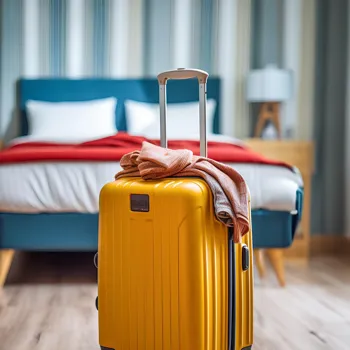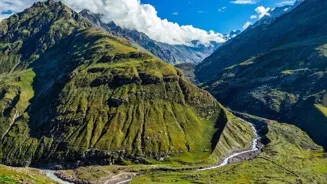Embarking on your first international adventure? Discover the 10 key steps to ensure a smooth and memorable journey. Read more!
Dreaming of that Eiffel Tower selfie or strolling along the Great Wall of China?
Your first international trip can be an incredibly exciting experience, but it also requires careful planning and preparation. It's not just about booking a flight and showing up!

To ensure your adventure is smooth and memorable (in a good way!), here are 10 key steps to guide you:
Define Your Destination and Travel Style
First things first, figure out where you want to go! This isn't just about picking a country; consider what kind of experience you're after. Are you drawn to historical sites, bustling cities, serene beaches, or adventurous hiking trails?

Think about the climate you prefer, your budget, and the activities that excite you. Also, what’s your travel style? Backpacker on a shoestring, comfortable tourist, or luxury explorer? Knowing this will shape your itinerary and accommodation choices.
Research different destinations online, read travel blogs, and talk to friends who've travelled internationally. Once you have a clear idea of what you want, narrow down your options and choose a destination that aligns with your interests and budget.
This foundational step determines the entire course of your trip, influencing every decision from签证 requirements to packing essentials.
Budgeting and Saving like a Pro
International travel can be expensive, so creating a realistic budget is crucial. Estimate the cost of flights, accommodation, food, transportation, activities, visa fees (if applicable), travel insurance, and souvenirs. Don't forget to factor in a buffer for unexpected expenses.
Once you have a budget, start saving! Set up a separate savings account dedicated to your trip, and automate regular transfers. Look for ways to cut back on your expenses in your daily life, such as eating out less frequently or finding free activities to enjoy.
Research affordable accommodation options like hostels, guesthouses, or Airbnb. Consider travelling during the off-season to take advantage of lower prices. Remember, the more you save beforehand, the more relaxed you'll be able to enjoy your trip without worrying about overspending.
Explore travel rewards credit cards, cashback programs, and frequent flyer miles to maximize your savings.
Passport Power and Visa Ventures
Your passport is your golden ticket to international adventures! Make sure it's valid for at least six months beyond your intended return date. If it's expiring soon, renew it well in advance to avoid any last-minute stress. Next, research the visa requirements for your chosen destination.
Some countries offer visa-free entry to Indian citizens, while others require you to apply for a visa before you travel. Check the official website of the embassy or consulate of the country you plan to visit for the most up-to-date information on visa requirements and application procedures.
Allow ample time for the visa application process, as it can sometimes take several weeks or even months. Gather all the necessary documents, such as your passport, photographs, and travel itinerary, and fill out the application form accurately.
Don't leave this to the last minute, as delays can ruin your travel plans! Keep a digital copy of your passport and visa in case of loss or theft.
Flight Finesse
Booking Smartly: Now comes the exciting part: booking your flights! Start by browsing different airlines and online travel agencies to compare prices and find the best deals. Be flexible with your travel dates, as flying on weekdays or during the off-season can often save you money.

Consider booking connecting flights instead of direct flights, as they are usually cheaper. Read reviews of airlines before booking, and pay attention to baggage allowances and any additional fees.
Once you've found a flight that suits your budget and preferences, book it as early as possible to secure the best price. Keep an eye out for special promotions and discounts offered by airlines. Sign up for email alerts to be notified of fare drops.
Don't forget to factor in travel time and potential jet lag when planning your itinerary. Ensure you have sufficient time for transfers between flights, especially if you're travelling with connecting flights.
Accommodation Adventures
Home Away From Home: Your accommodation will be your base during your trip, so choose wisely! Research different types of accommodation options, such as hotels, hostels, guesthouses, Airbnb, and apartments. Consider your budget, travel style, and location preferences.

Read reviews from other travelers to get an idea of the quality and amenities offered. Book your accommodation in advance, especially if you're travelling during peak season or to popular destinations. Look for deals and discounts on booking websites.
Ensure that the accommodation is conveniently located near public transportation and attractions. Pay attention to the cancellation policy in case your plans change.
If you're travelling on a budget, consider staying in hostels or guesthouses, which offer affordable accommodation and opportunities to meet other travellers. Airbnb can be a good option for longer stays or if you're travelling with a group.
Crafting Your Itinerary
A Delicious Travel Menu: While spontaneity can add excitement, having a basic itinerary is essential for a smooth trip. Research the must-see attractions, activities, and experiences in your chosen destination. Consider your interests, budget, and travel style when planning your itinerary.
Prioritize the things that are most important to you, and allocate sufficient time for each activity. Don't try to cram too much into your itinerary, as this can lead to stress and exhaustion. Leave some room for flexibility and spontaneity.
Research local transportation options, such as metro, buses, or trains, and plan how you'll get around. Book tours and activities in advance, especially if you're travelling during peak season. Look for free activities and attractions to save money.
Create a daily itinerary that includes the activities you plan to do, the estimated time for each activity, and the transportation you'll use to get there. Share your itinerary with family or friends in case of emergency.
Travel Insurance
Your Safety Net: Travel insurance is a must-have for any international trip. It can protect you from unexpected events such as medical emergencies, trip cancellations, lost luggage, and theft.
Research different travel insurance providers and compare their policies to find one that suits your needs and budget. Make sure the policy covers medical expenses, evacuation, repatriation, and loss of personal belongings.
Read the fine print carefully to understand the coverage limitations and exclusions. Keep a copy of your travel insurance policy with you and share it with your family or friends. In case of emergency, contact your insurance provider immediately.
Remember, travel insurance is an investment in your peace of mind. It can provide financial protection and assistance in case of unforeseen circumstances.
Packing Perfection
Light and Smart: Packing for an international trip can be a challenge, but it doesn't have to be stressful. Start by creating a packing list based on your itinerary and the climate of your destination. Choose lightweight and versatile clothing items that can be mixed and matched.
Pack only what you need, and avoid overpacking. Roll your clothes instead of folding them to save space. Use packing cubes to organize your belongings. Pack essential toiletries in travel-sized containers. Don't forget to pack any necessary medications, along with your prescription.
Bring a universal adapter for charging your electronics. Pack a first-aid kit with basic supplies such as band-aids, pain relievers, and antiseptic wipes. Leave some room in your suitcase for souvenirs. Wear your heaviest shoes and jacket on the plane to save space in your luggage.
Health and Safety First
Prioritizing Wellbeing: Before you travel, consult your doctor about any necessary vaccinations or medications. Research the health risks associated with your destination and take precautions to protect yourself.
Pack a basic medical kit with essentials such as pain relievers, antiseptic wipes, and motion sickness medication. Drink bottled water and avoid eating street food from questionable vendors. Be aware of your surroundings and take precautions to prevent theft and scams.
Avoid walking alone at night in unfamiliar areas. Keep your valuables secure and out of sight. Learn a few basic phrases in the local language to communicate with locals. Register with your embassy or consulate so they can contact you in case of emergency.
Staying Connected
Communicating Across Borders: Staying connected with family and friends back home is important, especially during your first international trip. Research different options for international calling and data plans. Consider purchasing a local SIM card upon arrival in your destination.
Download messaging apps such as WhatsApp or Viber to communicate with others for free over Wi-Fi. Inform your bank and credit card companies of your travel dates to avoid having your cards blocked. Set up international roaming on your mobile phone if you plan to use it for calls or data.
Utilize free Wi-Fi hotspots in hotels, cafes, and public areas. Be mindful of data security when using public Wi-Fi networks. Remember to adjust your clock to the local time zone.
AI Generated Content. Glance/InMobi shall have no liability for the content











